Passes is a broad term that covers a variety of income/revenue structures including:
- Gift Certificates
- Purchased for a dollar denomination and then given to another patron who can use the gift certificate as cash to purchase tickets for a performance
- Flex Passes
- Provide free or average cost per admission to a predefined number of tickets and/or performances
- Memberships
- Entitle the holder to a monthly newsletter, advanced ticket purchases, discounts on qualifying admissions, etc
- Vouchers
- Other Income
Since the name of this field is customizable in Company Preferences >> Appearance Tab, some organizations may retain the term Passes, while others change it to reflect their own terminology such as GC/Pass, Gift Certs, Memberships, or even Other Income. The nomenclature in your database may be different, but functionally the terms are interchangeable. Throughout these help pages, the term Passes will be used.
While a pass seems like something you are selling, it really is, first and foremost, a payment method. People buy passes or gift certificates with the expectation that they can redeem them at a future date. Some passes will cover the value of their redeemed items in full, while others may be limited and require an additional payment to cover the cost of the redeemed items.
As a payment method, most passes should be tax-exempt (though the total intended redemption value may include taxes). At time of sale, the value of the pass is generally deferred in a liability account. When a portion of it is used to pay for tickets, the ticket will have the actual taxes payable calculated at the time of ticket sale and the pass value will cover the collective cost of the ticket (and any associated taxes).
Different pass setups or types can be added under Setup >> System Tables >> Pass/G.C. Types. The Pass Tab of a patron account) is used to sell/book passes, memberships, vouchers, coupons, or other non-ticket and non-donation related items.
Method of Redemption Top
There are 5 different redemption methods that you can choose from when setting up a pass in Theatre Manager. Each one serves a specific purpose, yet remains flexible in the parameters you determine. There are three admission-based methods (free admission, dollar value, average dollar per admission), and two membership-style methods (can't buy a thing, use promotion):
Free Admission Top
A free admission pass is simply that, a pass that can be redeemed for "free admission." If you are giving away a ticket to an event in a radio giveaway or an auction, you can create a free admission pass. This allows the recipient to exchange the free admission pass for an actual comp ticket to an event.
Dollar Value Top
A dollar value pass is essentially a gift certificate. If the patron gives you 50 dollars to use at a later date, then redeems the pass towards whatever the purchase value of tickets, it should be set up as a dollar value.
Average Dollar Per Admission Top
An average dollar per admission pass, more commonly known as a "flex pass", means that a patron purchases a pack of X admissions for Y price, then redeems the pass for tickets on whatever schedule the patron wishes. So, if the flex pass is $100 for 5 admissions, regardless of the actual price of the ticket, Theatre Manager will attribute $20 ($100/5) to each event where the pass is redeemed. The parameters can be set such that the patron can use one, some, or all admissions on the same performance. There is also a parameter option to set a maximum per admission value, which allows the flexibility to up-charge on more expensive performances. For example, if the maximum is set to $25 and the pass holder attempts to redeem the pass on a $30 ticket, Theatre Manager will apply $25 from the pass but leave a $5 balance to be paid in some other form. This redemption method is rapidly becoming more popular as a flexible or pick-your-own subscription alternative to traditional "all-in" subscriptions.
Cant Buy A Thing Top
A can't buy a thing pass is used as a true membership, such as a symphony league, community players, or other membership group. This can also be used to track sales for miscellaneous items such as merchandise, concessions, advertising sales, rental fees, or other miscellaneous forms of income.
Use Promotion Top
This pass type is designed to allow pass holders access to reduced admission prices (via a sales rule) for a specific time period. When this pass is used, the price of the tickets changes from the original promotion to something else. Some use examples for this method are an annual movie pass, alumni who receive a "2 for 1" discount, cast/crew/staff/volunteers who receive a dollar discount, or donors who receive a set benefit percentage discount.
Redeemable By Top
In addition to the redemption method, there are four different options to control who can (and cannot) redeem a pass.
The various combinations of redemption methods and redeemable by options make passes a highly versatile tool for accepting money, delivering benefits, tracking non-ticket and non-donation deliverables, etc. Most combinations require the pass number and/or secret redemption code for successful redemption online. The pass number is a unique ID number automatically assigned to each sold pass to identify it in the system. The redemption code is a secret 15-digit serial number also unique to each pass. The box office staff can only see this redemption code if it is printed on a ticket face or on a letter. This "secret" redemption code is not needed to redeem a pass internally, but is required for online redemption for security reasons. Under certain circumstances, Theatre Manager may support redemption codes embedded in track III on specialty plastic cards. If this is of interest, contact Sales to find out more about the encoding and where to source cards.
To read more about these options, check out the Pass Setup Detail Window >> Redemption Rules Tab.
Purchaser Only Top
Only the patron who purchased the pass will be able to see it online and redeem it. This is good when you wish to limit the pass to the owner alone, such as a membership benefit.
Any Household Member Top
Any member of the same household can see it online or redeem the pass. This is good for a flex pass where you may want it redeemable by the patron, their spouse, or any other members of the household.
Any Patron (Visible to Purchaser) Top
This type of pass shows up in the purchaser's account and can also be redeemed by any patron in the database, which is good for traditional gift certificates or raffle/giveaway vouchers where you do not know the final user at the time of the sale.
Any Patron (Not Visible to Purchaser) Top
This type of pass can be redeemed by any patron in the database, but is not visible in the purchaser's online account. This option is good for traditional gift certificates or raffle/giveaway vouchers where you do not know the final user at the time of the sale.
Redemption Rules Top
A pass can only be redeemed if all the following are true:
- There are still redemptions available (e.g. there is an admission left or money left on a dollar value pass)
- It has not yet expired
- The pass type is marked active
- The patron redeeming it is allowed to do so as per the pass setup (e.g. patron only, any household patron, etc.)
- The pass is fully paid (unless the current user is permitted to use unpaid passes as a payment)
- For patrons redeeming online, the pass must be fully paid for, without exception
The above rules apply to employees redeeming a pass or patrons redeeming a pass online. For online redemption, there is an additional requirement that the pass type is marked as redeemable via the internet.
Review what the Pass Lookup Window does in the Payment Screen and learn how to redeem a pass.
Redemption Valid Events Top
Passes have a unique optional feature that Allows Setting of Valid Events on each Pass/G.C.. In most cases, ALL passes that are associated with a pass type redeemable for tickets can either:
- Be used for any event available for sale
- This would be the standard case for a gift certificate style pass. The patron spends $100 on a gift certificate that they give their son, who later applies it to tickets for any event he is interested in.
- Be used for a specific subset of shows
- This would be the standard case for a flexible subscription pass. The patron buys a 3-show season pass and chooses which of the 6 eligible subscription events they want to see.
Sometimes, however, you may want to specify which events a SINGLE INDIVIDUAL pass can be redeemed for. This means that an employee sells a patron a pass and AT THE TIME OF SALE picks which event(s) that patron will be able to purchase with their pass. This employee choice could be setup to either allow selection of any event in the database or to allow selection only from a pre-determined subset of events.
When would this feature be useful? Here are some use case scenario ideas, though the feature is limited only to your imagination:
- Corporate sponsor comp tickets when you want to limit the sponsor's contracted comp use to only the show that they are sponsoring
- Actor/designer ticket discounts that are only good for the event(s) that actor/designer is working
- Student scholarships when each student can only apply their awarded amount towards a pre-approved course or term
- Contracted ticket trade value when a company, in return for services, is eligible for comp tickets for some events but not the especially popular titles
New or Renew Pass Top
The pass renewal feature is used for pass types setup as renewable. Once such a pass has expired, the patron can renew it and Theatre Manager:
- Will maintain the same control number
- Activate the Pass Detail Window >> History Tab
In most cases (e.g. flex passes or subscriptions, gift certificates, VIP discount benefit passes, etc.), passes should NOT be renewed. A new pass of the correct type should simply be sold to the patron with a new control number, new expiry date, etc.
However, in the case of an ongoing membership (e.g. a guild, league, etc.), renewing an existing pass is a viable option. These kinds of pass types are usually Can't Buy a Thing or Use Promotion types.
Online Discount Pass Top
A pass can be used for a wide variety of uses, including to provide a discounted purchase price with a higher redemption value. This type of gift certificate is most often used for special holiday or Black Friday offers (e.g. buy a $100 gift certificate for $75 during these special promotional dates). The example below walks through the setup of a gift certificate that provides a 10% discount on the purchase price when a patron redeems the pass. In other words, a purchaser can spend X to give (or use themselves) X/9% in future ticket purchases.
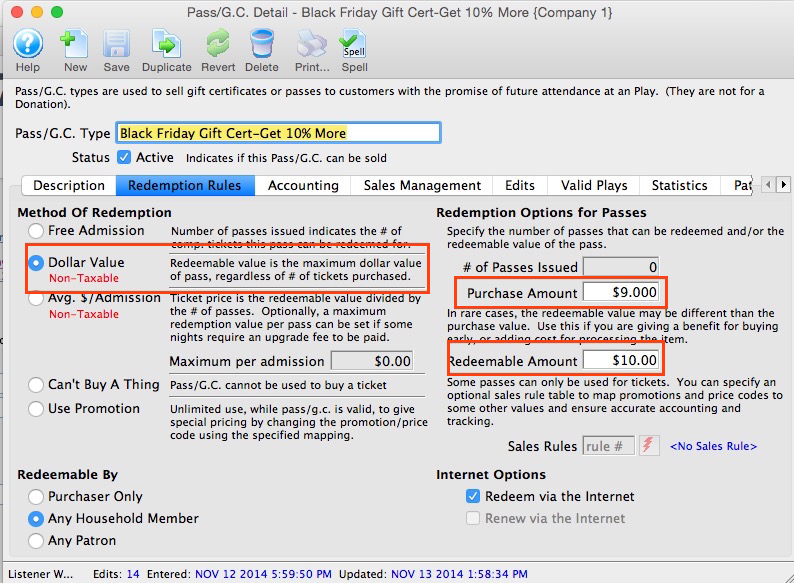
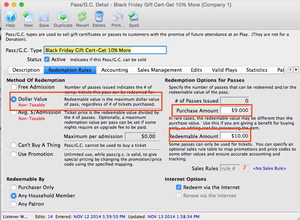
When creating the pass type, select a Dollar Value redemption method and adjust the Redemption Rules Tab so that the Purchase Amount of the pass is 10% less than the Redeemable Amount. In this screenshot, the pass is bought for $9 and worth $10. Under the Accounting Tab, set the Redemption/Expense Account as the G/L account where the price difference ($1 in this case) should be posted.
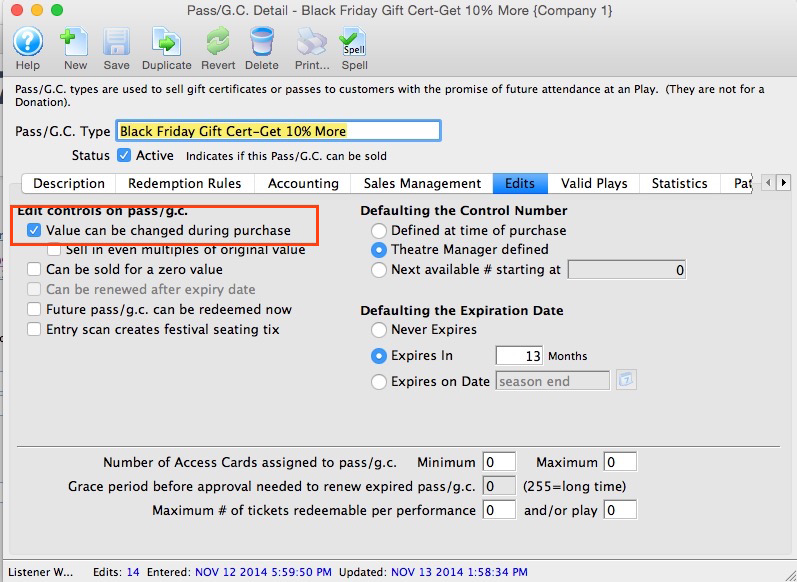
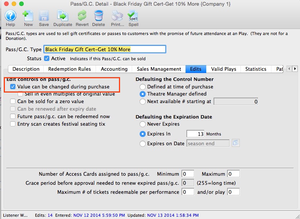
To allow the pass to be purchased at whatever amount the patron wants, make sure to check the Edits Tab option for Value can be changed during purchase. Theatre Manager will calculate the corresponding 10% redemption value based on the differential between the Purchase Amount and Redemption Amounts you set up on the Redemption Rules Tab. So, a patron can purchase this pass for $90 and get $100 of redemption value. The $10 difference will be posted to the Redemption/Expense Account in the Accounting Tab.
Gift Certificate Recipient Top
How does one approach the problem of selling gift certificates to a patron that will eventually end up in the hands of another patron (after being given as a gift by the purchaser to the recipient)? There is a common misconception that a gift certificate must somehow be moved FROM the patron account who purchased it TO the patron account of the person who the patron wants to gift it to. In Theatre Manager, this is not true.
When someone buys a gift certificate, simply give them a printed gift certificate with two specific fields on it. There is nothing further that you need to do. One person can buy many gift certificates and give them away to whom they choose. The venue does not need to know who got them in order to allow redemption.
Theatre Manager conveniently separates the dual functions of selling and redemption. This means that the venue will know who likes buying gift certificates (to market to them again) and who likes using them (so you can see if they want to buy some in the future). It is not the venue's responsibility to transfer gift certificates from one patron to the recipient since the purchaser of the gift certificate might change their mind as to who they want to give them to long after they have purchased.
Think of gift certificates in Theatre Manager just like the pre-filled banks of gift cards in grocery stores for companies like Apple, The Keg, Lowes, supermarkets, etc. The purchaser buys a dozen gift cards at the grocery store checkout, which activates them. Then the purchaser gives them to friends. The grocery store never is part of who they go to. The friends/recipients rub something off the back of the card to get the secret redemption code so that they can redeem the gift card in person or online as if it was cash.
Just as the grocery store is never responsible for the distribution of the cards to the friends of the purchaser, the box office is never responsible for assigning gift certificates to recipients, only the initial production of the actual gift certificate.
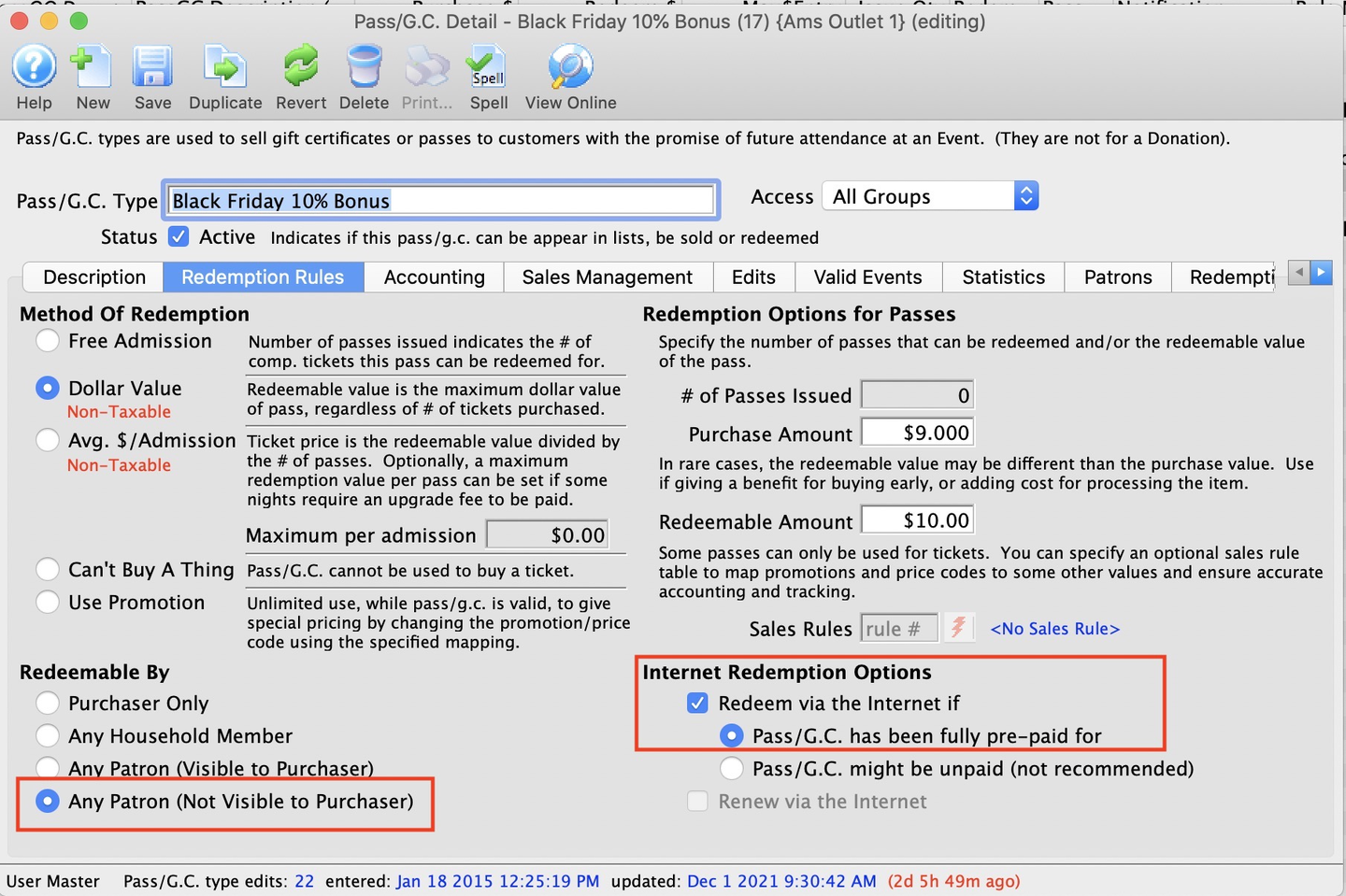
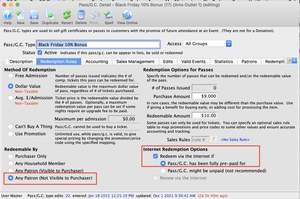
To set up gift certificates in Theatre Manager, you make a pass type that can be used by anybody ALA this example.
The next step is to give (email or print) the gift certificates to the patron using a letter merge. You can make this letter as fancy as you want, but you must include both of the following fields:
- Control number
- Secret redemption password
These are the fields that make it possible for recipients to redeem gift certificates.
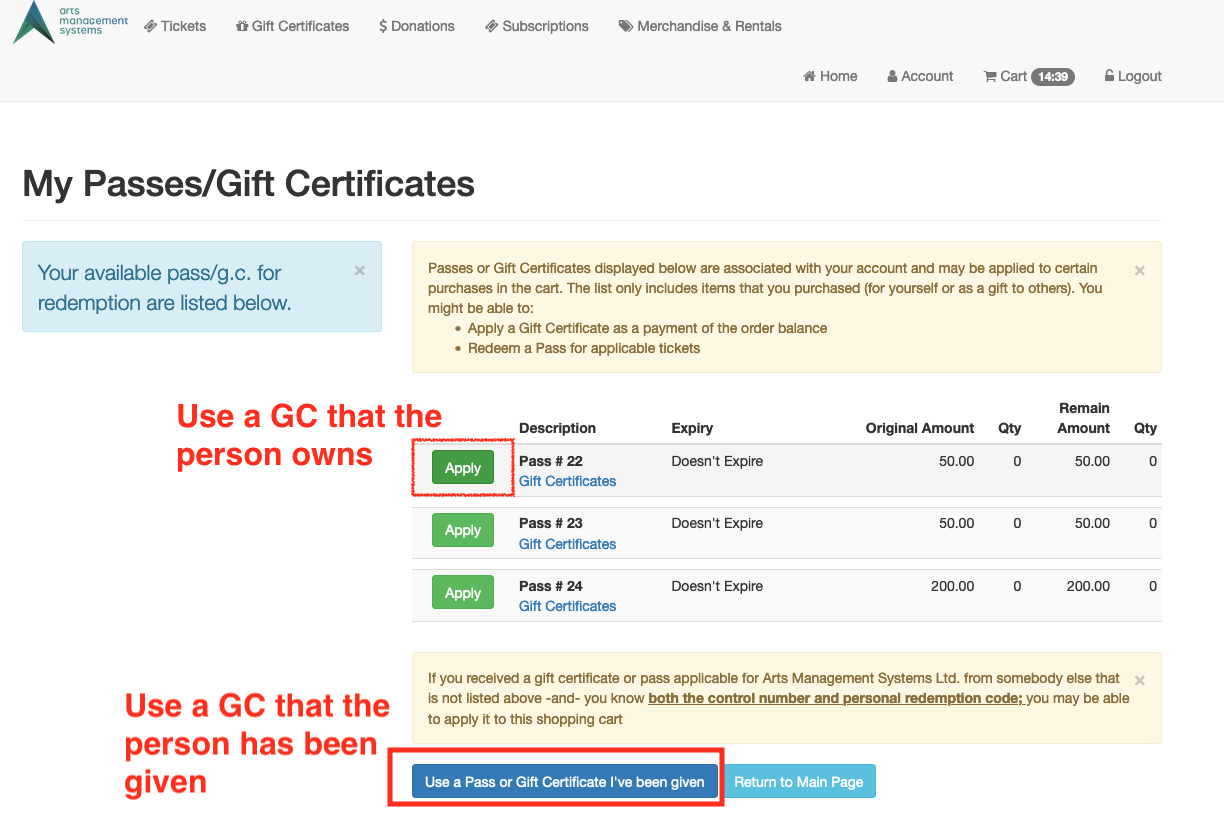
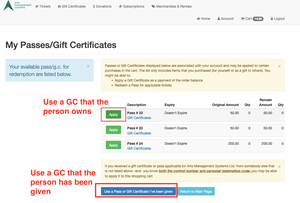
After the patron gives the gift certificates to whom they want, the recipients redeem:
- At the box office
- Box office staff just need the control number
- Online
- By purchasing patron
- Patrons select it from a list on their account
- By recipient
- Requires both the control number and the secret redemption code
- Once used, the pass will remain on their account until fully redeemed
- By purchasing patron
To illustrate the process best, review how a recipient redeems a gifted pass online.
Troubleshooting Pass Redemption Top
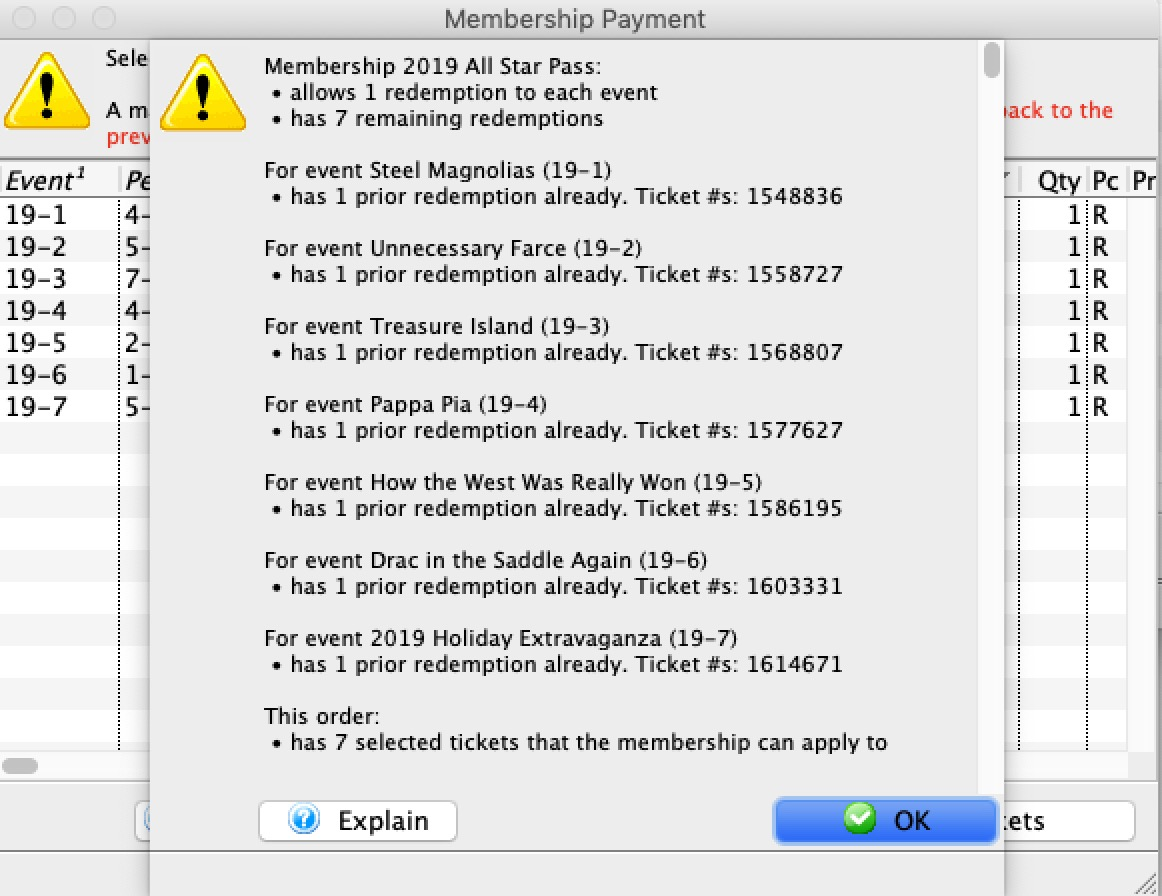
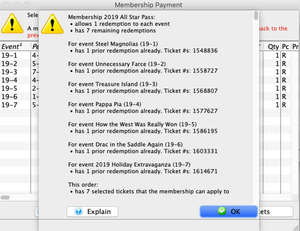
Sometimes you see an error screen like this one when you try to redeem a pass. Often this means that there is some other ticket in the database that already has the pass number associated with it. The general cause of redemption errors are:
- The patron has no passes left to use
- The patron has used the maximum redemptions of passes on each event
- The patron has used the maximum number of redemptions on each performance
- The price code on the selected ticket is excluded from use on the pass setup
- The pass (average dollar per admission type) was previously used as a payment and then the payment was deleted before depositing
In this last case, Theatre Manager does not take the pass redemption number off of the tickets that the pass was previously used for because it has already reduced the price of those tickets. The only way to use the pass again is to exchange or reprice the tickets containing the pass back to the original price and thus clear the pass redemption association.
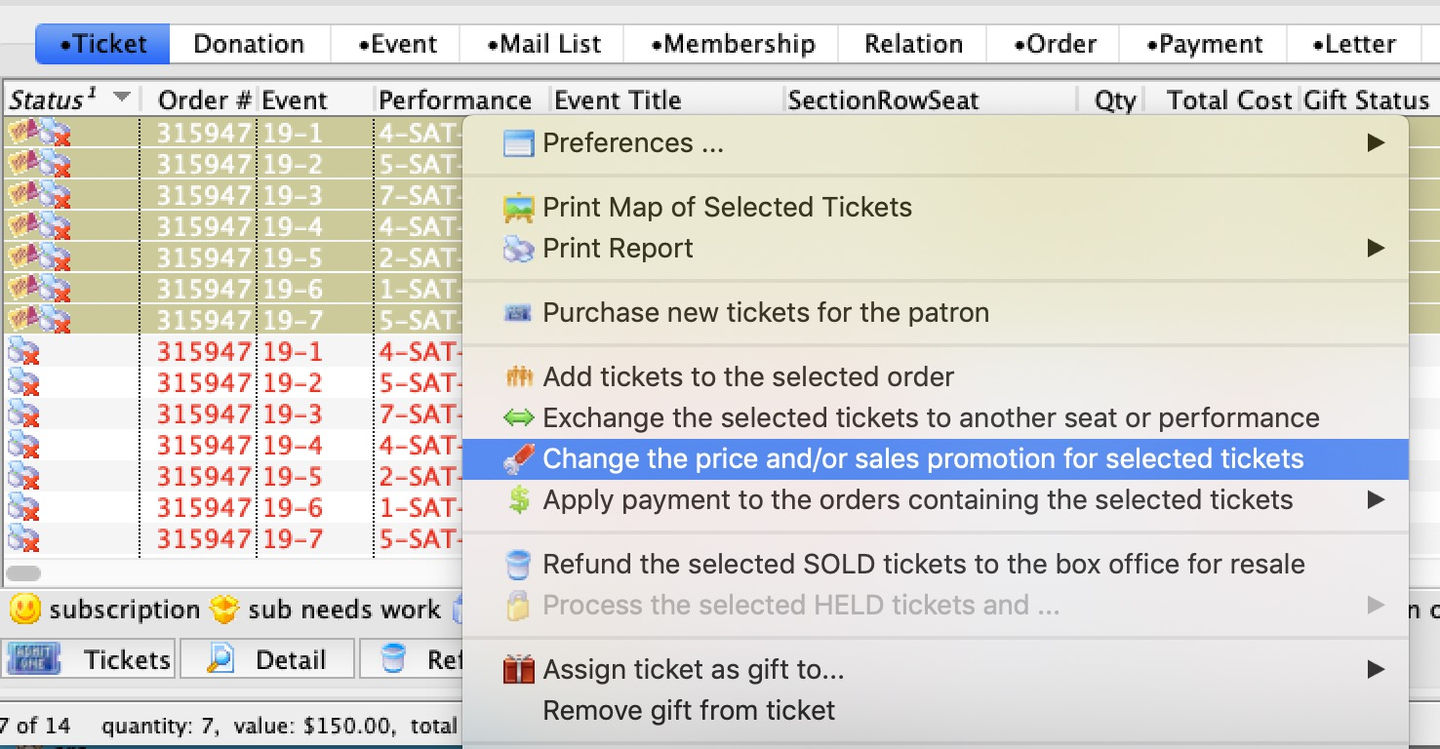
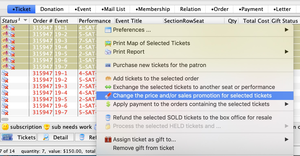
If the error message indicates that either:
- The pass was previously used and then deleted as a payment before end-of-day
- The pass has been used already, and you are sure it has not because the prior payment was deleted
Then you can follow these steps to find and clear the redeemed flag:
- Find the order containing the tickets
- Select the tickets associated with the pass
- Change the price of the tickets
- Redeem the pass again
Theatre Manager ensures that you must fix the price of the "old" tickets before using the pass again so that you cannot inadvertently give the discount twice.
Access Cards Top
Access cards can be used to grant access to a pass by multiple people for a period of time. Each patron can have their own access number and/or physical card ALA:
- Costco family pass
- Gives you and another family member access to the store for a year, at which point it can be renewed (or not)
- Hotel room keys
- Multiple keys allow multiple people their own access to a particular room for a set length of time
Access cards can be printed on ticket stock or attached to a magnetic swipe card for speedy redemption by the cardholder.
Originally conceived as a movie pass, Theater Manager's access cards have applications for a wide variety of organizational programs, including group sales, corporate dales, student payments, and promotional offers. When setup appropriately, they can be used to control or manage ongoing access to a facility (e.g. swimming lessons, gym use, family member discount access, etc.). Here are some examples to illustrate a few options:
- As a film pass
- A family purchases a film pass setup as an Average Dollar Per Admission type and select 5 separate access card for each member of the family.
- Every time a family member attends a movie, they use their access card to get the appropriate discounted rate, pay for the ticket, and deduct admissions from the original movie pass.
- As a group gift certificate
- If a grandmother gives a $1,000 gift certificate to her three grandchildren, each grandchild gets their own card tied to the original gift certificate.
- Each time any of the grandchildren use their membership card, the amount of the sale is deducted from the $1,000 gift certificate.
Scanning Access Cards Top
Passes and access cards that are associated with pass types that allow admission can be scanned in for fast admission to a facility. This is a rare-use feature for specific situations like a gym membership access card.
Using the dedicated Scanning Card Window, employees can take a patron's bar or mag coded access card when a patron walks in and either scan it in with a scanner device or type the pass number in. The system will pull up their picture (if it exists in the database) and other pass details to help decide if the patron is permitted to enter the space.
Accepting admission adds a dated scan record to the Scan History Window so that you can see a history of who was scanned in by date.
Write Off Top
Writing off a pass is a specialized function of Theatre Manager. In short, the process identifies any unused portion of an old pass (unredeemed admissions and values) and transfers this amount from a liability account to an unearned income account.